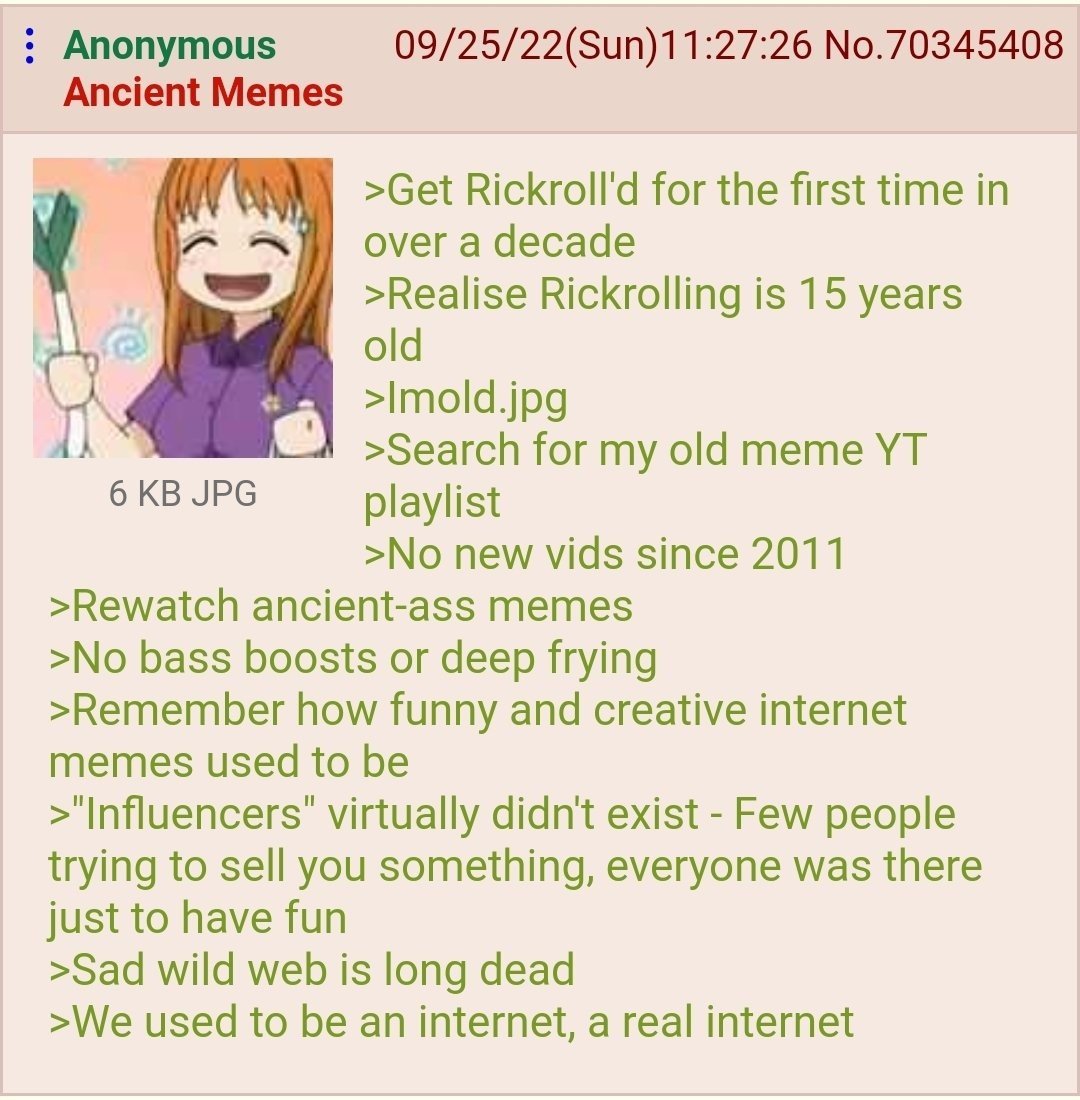this post was submitted on 05 Oct 2024
1244 points (98.0% liked)
Greentext
6755 readers
711 users here now
This is a place to share greentexts and witness the confounding life of Anon. If you're new to the Greentext community, think of it as a sort of zoo with Anon as the main attraction.
Be warned:
- Anon is often crazy.
- Anon is often depressed.
- Anon frequently shares thoughts that are immature, offensive, or incomprehensible.
If you find yourself getting angry (or god forbid, agreeing) with something Anon has said, you might be doing it wrong.
founded 2 years ago
MODERATORS
you are viewing a single comment's thread
view the rest of the comments
view the rest of the comments

I feel the same about the early (home) internet (years 1994-1999). Adverts if they even existed on a page were just a few lame gifs on a page. IRC and usenet were the "social media" of the time, except no-one called it that. Almost everyone online was as much of a geek as you (except AOL users), because the hoops to get online were significant enough to keep most normal people away. Businesses were convinced it was a fad, so didn't get too involved.
It was basically universities, students and a handful of modem owners that could get a TCP/IP stack to work and write a login script (ppp was quite rare in the beginning).
Rose-tinted glasses? Maybe, but there's a lot not to like about the modern internet.
Stop, you're making me cry.
I set up one of the first Echomail and Fidonet nodes in my country and was pretty active in the days the internet started. It was such a community effort, and seeing people start to grab hold and use it was a complete rush. To see what it turned into is utterly heartbreaking, but I guess it was predictable.
I see everyone talk about how we need to drive Linux adoption, and I get scared as fuck about what that would mean to Linux in 20 years. I don't want to see that community vaporize the same way.
I think there'll always be weird nerds getting excited about niche things. It's exhausting to have to keep finding new spaces, but to some extent, I think that's our lot in life: we're like lyme-grass growing in sand dunes — pioneer species that grow where other things can't (or won't), putting down roots so other things can grow.
Unfortunately, the pioneer grasses can't survive indefinitely in the communities they build; their existence acts as a windbreak and encourages more sand to settle, causing the sand dune to form quicker than they can grow, eventually being smothered by the dunes they helped established. They have to find somewhere else to grow, somewhere new — the sand dune of tomorrow. That's why, when there's a series of sand dunes at a beach, you see a sort of progression, moving from more established sand dunes to younger ones as you get closer to the shore.
Maybe in 20 years, Linux will be unrecognisable to us, and maybe that space will no longer be home to nerds like us. But we'll always find something new to be excited about; the community won't be vaporised, it'll just be rejigged a bunch, as we discover new areas to put down roots. That is sad, but I think the alternative would be sadder, in a way. I don't mean if Linux doesn't become widely adopted, but if people stop trying to push for that — at the core of this movement/community is a bunch of people saying "hey, look at this really cool thing I care about".
It's easy to blame the Marram grasses for crowding out the early pioneers, but we do this to ourselves, by building tools for others to use, and working on outreach. In a way, that's how we survive, because our community relies on people who are excited about building something new in an unexplored problem space; more gatekeepy communities may maintain their "ideological purity" for longer, but they inevitably die out.
It sucks to feel crowded out by the masses, but there'll always be new spaces for people like us, because we're good at building and tinkering. After all, look at where we are right now. Lemmy isn't especially radical or new, but the atmosphere here is incredibly different to Reddit. I'm way more likely to find thought provoking discussions like this thread, for example, and to care enough to write comments like this.
Amateur radio is still somewhat like this, but nothing like it used to be. That used to be the ultimate nerd hobby. My dad was a ham and I eventually got my license, but I don't find it anywhere near as fascinating anymore. But it was the original opensource project, and you used to share info on the hobby over the airwaves coming out of the machine you built by hand.